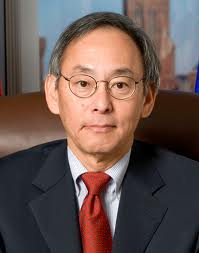
Former Energy Secretary, Steven Chu, has said that big energy companies push against solar presents ‘bullshit arguments’ and utilities need to get into the solar power game.
In their attempt to continue ‘strong arming’ customers, big energy companies are trying to discourage solar power installations by asking for new regulations, higher connection charges and specials tariffs – an attempt to save themselves from a ‘death spiral.’ LINK This is not something that ‘might happen’ or is only a long way in the future. It is already happening. Germany’s largest utility company is closing more than a quarter of its power plants in Europe and another has announced a loss of profits of $3.8billion in unprofitable fossil fuel plants.
Mr Chu was the Energy Secretary around four years (from 2009 to April 2013) and is also a Nobel Prize winning physicist. Chu describes Hawaii’s (and others) attempts to slow solar by citing “grid stability” as a “bullshit argument.” He says that solar only jeopardizes the grid when it takes over 20% plus of its customer base – Hawaii is at 2%.
Chu says that ‘they think they have it solved’ by increasing connection fees but those fees are only going to increase as more and more customers install solar energy systems.
“Instead of that, you need a better business model,” Chu said. “So I’m telling utility companies, this is coming down the line, so let’s think of a new business model where you can profit from this.”
Chu’s solution is for utility companies to get into solar power by installing panels and batteries on customer’s houses and selling them their electricity at a cheaper rate. The batteries will allow for a customer’s lights and fridge to be powered for a week ‘off the grid’ in the event of a power outage. This will mean solar installers will get increased business, customers will get cheaper electricity (and a solar system without installation costs) and the utility companies will own the solar electricity systems.
This solution allows for utility companies to expand the grid without physically installing new lines as well as giving the grid what it wants – increased stability. AND all in an environmentally friendly manner.
“This is not a radical model,” Chu said, “this is the old telephone system model, where the telephone companies owned the phone, they rented you the phone for so long, they maintained it.”
